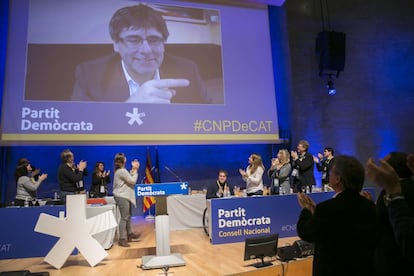Puigdemont cannot be sworn in remotely, say Catalan parliament lawyers
A committee will decide whether deputies in prison and in Brussels may take part in the vote

A new report by the parliamentary counsel at the Catalan regional assembly states that the Catalan premier cannot be invested remotely, dampening the hopes of Carles Puigdemont, who has been pushing to be sworn in from Belgium.
The appointment of a premier must be “direct and personal”
Puigdemont fled to Brussels in late October following a unilateral declaration of independence to avoid facing charges of sedition, rebellion and misuse of public funds. At the snap regional election of December 21, Puigdemont’s pro-independence Junts per Catalunya won the second-highest number of seats and votes – behind the unionist party Ciudadanos – and he is now seeking to form a majority government with the support of pro-independence parties Republican Catalan Left (ERC) and CUP.
But the new document, written by eight lawyers, says a premier cannot be sworn in unless he is physically present in the chamber. The appointment of a premier must be “direct and personal,” otherwise it does not meet “statutory or regulatory norms,” according to the report. While Puigdemont’s party supports a remote appointment, the ERC had said it would leave the decision in the hands of the lawyers.
The report explains that the swearing-in process is not simply a question of “verifying” or “confirming” a candidate as premier, but rather to “foster dialogue between the candidate and the deputies, so that the ensuing debate over their program can muster up the necessary support for them to be invested and retain confidence.”
A vote can only be delegated if a deputy is on maternity or paternity leave, sick or “permanently incapacitated”
The text rejects the argument from Puigdemont’s supporters that this process can take place remotely or that another deputy could stand in place for the real candidate by reading out a statement. In the report, the parliamentary counsel avoid the semantic debate over what “in front of” means in a regulatory phrase that says candidates must defend their programs in front of the chamber. Instead they argue that “respect for the basic rules of the parliamentary process makes it imperative not only that the protagonists attend the debate in person, but also that there be spoken, direct argumentation and the guarantee of immediacy so that everyone may see, feel and understand the debate in person.”
Other deputies
The report, however, does not address whether the other absent deputies may delegate their vote if they cannot be present in the chamber. This decision, says the counsel, should be made by a transitional board of officers known as the Mesa de Edad (literally, board of the elders). Three deputies – Oriol Junqueras, Joaquim Forn and Jordi Sánchez – are currently in pre-trial detention in connection with the rebellion probe, while four more are in Brussels with Puigdemont. The lawyers indicate that under Article 93 of parliamentary bylaws a vote can only be delegated if the deputy is on maternity or paternity leave, sick or “permanently incapacitated” – conditions which are not met by the Catalan deputies.
The lawyers, however, support the “right to political participation of the affected deputies” and the “preservation of the parliamentary numbers," referring to the outcome of the December 21 election, which gave 37 seats to the pro-unity Ciudadanos, 34 to Junts per Catalunya, 32 to ERC, 17 to the Catalan Socialists (PSC), eight to the unaligned Catalunya en Comú-Podemos, four to the far-left CUP and three to the Popular Party.
Rajoy admits mistakes
On Monday, Prime Minister Mariano Rajoy admitted that his Popular Party (PP) has made mistakes in Catalonia, but said they were right to implement emergency powers under Article 155 of the Constitution to halt the illegal independence drive in the region.
“We, as a party, have made mistakes; we admit it and we will have to learn from them,” said Rajoy at a meeting of the national board of officials. “The response to this situation, as headed by the government, was good for Spain although it might not have been good for the PP.”
Rajoy underscored that secessionists have dropped their plans for unilateral independence, and warned that the government will resort to the Constitutional Court if ousted Catalan premier Carles Puigdemont attempts to get himself sworn in remotely from Brussels, where he is living in self-imposed exile after fleeing to escape the Spanish justice system. He is wanted in Spain in connection with a criminal investigation into rebellion, sedition and misuse of public funds during the independence drive.
If Puigdemont is sworn in remotely, Article 155 will remain in place, prolonging the central government’s takeover of Catalan self-government, said Rajoy.
English version by Melissa Kitson and Susana Urra.
Tu suscripción se está usando en otro dispositivo
¿Quieres añadir otro usuario a tu suscripción?
Si continúas leyendo en este dispositivo, no se podrá leer en el otro.
FlechaTu suscripción se está usando en otro dispositivo y solo puedes acceder a EL PAÍS desde un dispositivo a la vez.
Si quieres compartir tu cuenta, cambia tu suscripción a la modalidad Premium, así podrás añadir otro usuario. Cada uno accederá con su propia cuenta de email, lo que os permitirá personalizar vuestra experiencia en EL PAÍS.
¿Tienes una suscripción de empresa? Accede aquí para contratar más cuentas.
En el caso de no saber quién está usando tu cuenta, te recomendamos cambiar tu contraseña aquí.
Si decides continuar compartiendo tu cuenta, este mensaje se mostrará en tu dispositivo y en el de la otra persona que está usando tu cuenta de forma indefinida, afectando a tu experiencia de lectura. Puedes consultar aquí los términos y condiciones de la suscripción digital.









































